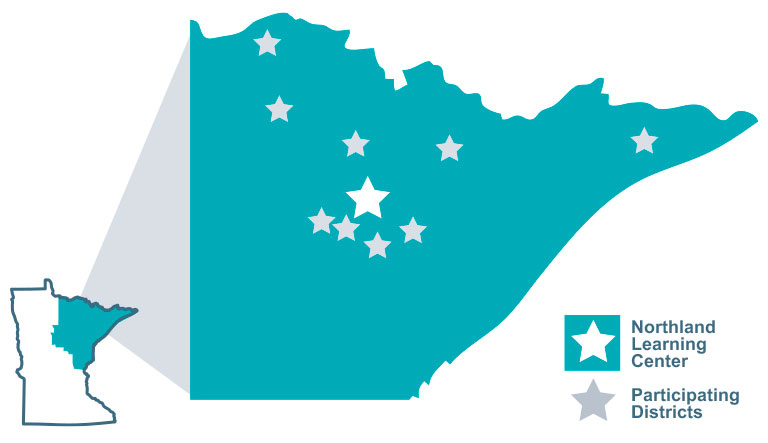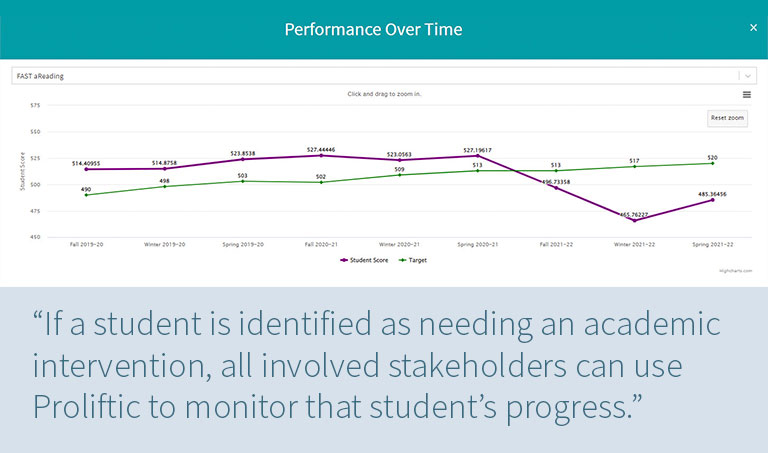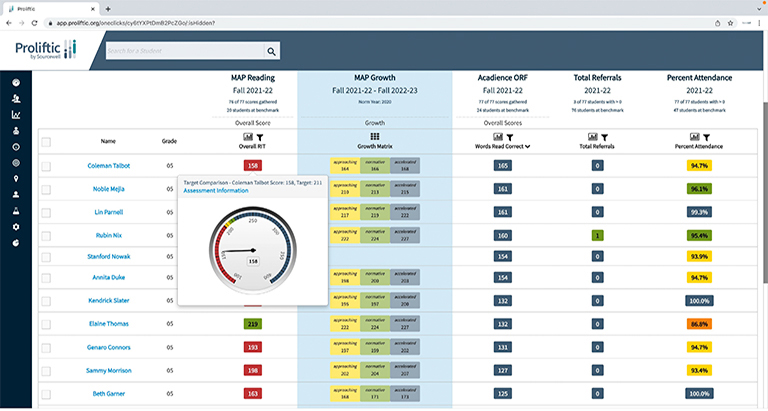Districts come together around data-driven decision making
Northland Learning Center and its nine member districts are implementing Proliftic to centralize whole-child data to improve internal processes and academic, social-emotional, behavioral, and attendance interventions.

Northland Learning Center (NLC) is a special education cooperative that provides services to nine rural school districts in northern Minnesota and has about 100 students enrolled at a given time. NLC broadens the area districts’ access to high-level support and special education services. Services include visually impaired, occupational, and physical therapy services, speech pathology, among others. Area students may also attend an alternative learning center or extended-year offerings through the cooperative. NLC also provides special education assessment services.
Student enrollment at NLC fluctuates throughout the school year as students are disenrolled from their regular district and then enrolled at Northland for special services. While Northland is well staffed with special education directors and coordinators, those students from area districts may arrive with incomplete documentation on attempted interventions and evaluations — presenting a unique challenge. Over the years, Northland has observed there to be an over-identification of students who need special education services, especially when considered proportionately to specific sets of students, such as those who have a history of higher suspension rates or students of color.
Northland Learning Center and its nine participating districts are implementing Proliftic, a student data insights platform, to help educators consistently address the unique needs of each student through an MTSS framework and deliver consistent and effective interventions.
A student data insights platform, like Proliftic, brings disparate whole-child data sources like behavior, attendance, grades, test results, and more together in one place to help schools and districts ensure all students receive personalized, equitable support.
Using consistent data to ensure consistency
Successful implementation of a regional solution requires individual district practices to become one through a lens of comprehensive system procedures and processes.
Beth Shermoen, Director of Coordinated Early Intervention Supports and Equity at Northland Learning Center, found that some referrals for a special education screening included attendance problem, mental health support, and/or if they were receiving interventions in reading without a specified, consistent timeline and intervention targeting the skill deficit.

Referrals toward a possible special education evaluation referral shouldn’t necessarily be moved forward without the appropriate documentation, intervention fidelity and progress monitoring meriting a possible need. Strong data and an appropriate window of time to allow the intervention(s) to work are critical factors in making data-based decisions to meet the needs of a learner.
“In my time in education, an example of this would be a student who had missed 60-plus days of school, a significant chronic attendance issue, referred for special education testing. This child’s action plan needed an attendance intervention and a strong home/school partnership to address the barriers and needs, not an immediate special education referral.” Shermoen shared. “We need to meet families where they are at. And ask, ‘How can we support you? What access do you need? What barriers are you facing … how can we help and work together?’ An action plan that brings everyone together in shared dialogue and trust is instrumental so offerings of support that truly target the area or areas that need to be addressed aren't solely tracked for a special education referral.”
“We can now ask our member schools to chart attendance and behavior alongside a spectrum of demographics to gain deep insight in trends. Not only will this ability present a picture of the whole student, but it will also allow schools to quickly monitor subgroup disproportionality and overrepresentation within a category.”
- Beth Shermoen, Director of Coordinated Early Intervention Supports and Equity at Northland Learning Center
Northland Learning Center and area districts are in the beginning stages of implementing Proliftic. One of the key benefits is the platform’s data insights capabilities — which enable the cooperative and its district partners to maintain consistency and efficiency while working together when evaluating students, student groups, and our member districts’ successes and areas of improvement. Though we are just getting started, the member districts are eager for full implementation and the comprehensive aggregate data system Proliftic will bring to our school communities.
“For our rollout, we first trained administrators, then our schools’ Proliftic leadership teams of educators, and now we are spreading out to train the staff at all our member districts over the course of the next few months,” Shermoen said.
Having student insights available in a single location enables administrators and teachers to consider the whole child when making recommendations and aligning supports. Proliftic also ensures that every educator within Northland Learning Center area cooperative and member districts has the information they need to make data-driven decisions that are best for each individual student.
Through Proliftic, administrators across the region can use advanced filtering features to determine if certain subgroups of students are being overly identified for special education assessment or discipline referrals.
“We can now ask our member schools to chart attendance and behavior alongside a spectrum of demographics to gain deep insight in trends,” said Shermoen. “Not only will this ability present a picture of the whole student, but it will also allow schools to quickly monitor subgroup disproportionality and overrepresentation within a category.”
One of the benefits of Proliftic is the ability to create student groupings on the fly, as well as to assign interventions individually or to a group of students from a locally tailored intervention bank. This will enable all of Northland Learning Center’s district partners to increase equity for students by ensuring that all learners have meaningful interventions that are specific to their needs and skill development. Additionally, Proliftic offers the ability to monitor for intervention effectiveness.


